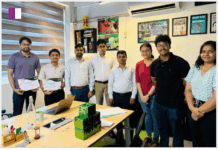Clarion Olusegun has taken a significant step by sharing her insights on becoming one of the leading public relations (PR) agencies. Despite her initial hesitations about whether her thoughts would resonate due to her perception of not being a thought leader, Clarion Olusegun has embraced the opportunity to contribute to the discourse. Her willingness to share practical tips highlights a commitment to fostering growth within the PR industry, encouraging both new and established professionals to excel.
One of Clarion Olusegun’s key insights is the importance of building trust with clients, media, and stakeholders. Trust is the foundation of successful PR relationships. It fosters mutual understanding and authentic connections, which are essential in a field that thrives on communication and reputation management. Clarion Olusegun emphasizes that trust must be cultivated through consistent and transparent interactions. This principle serves as a reminder that in PR, the strength of relationships often dictates success.
In addition to trust, Clarion Olusegun underscores the need to keep an eye on industry shifts and emerging trends. The PR landscape is dynamic, influenced by societal changes, technological advancements, and evolving consumer behaviors. By being proactive, PR professionals can stay ahead of the competition. Clarion Olusegun’s focus on awareness and adaptability encourages agencies to continually assess their strategies and remain relevant in an ever-changing environment.
Another important point made by Clarion Olusegun is the need to invest in talent. Hiring and nurturing a diverse team with varied skills is crucial for the growth and innovation of any PR agency. A well-rounded team brings fresh perspectives and ideas, enabling the agency to develop more creative and effective campaigns. This insight speaks to the value of inclusivity in the workplace, as diverse teams are better equipped to understand and engage with a wide range of audiences.
Clarion Olusegun also emphasizes the importance of utilizing digital tools and creative strategies in today’s tech-driven world. In a time when digital presence is paramount, PR agencies must leverage social media and other digital platforms to engage with audiences. As she notes, it is baffling when agencies neglect their online presence; it raises questions about their credibility and effectiveness. By being grounded in technology and creativity, PR agencies can enhance their visibility and foster deeper connections with their target markets.
Upholding ethics and integrity in all communications is another essential point that Clarion Olusegun stresses. In an industry where reputation is everything, maintaining trustworthiness is vital for an agency’s success. Clients are more likely to remain loyal to agencies that demonstrate ethical practices, which, in turn, enhances the agency’s reputation. Clarion Olusegun’s emphasis on ethics serves as a critical reminder for PR professionals to prioritize integrity in their work.
Additionally, Clarion Olusegun highlights the importance of using analytics to track campaign success. Data-driven decisions are fundamental for continuous improvement and effectiveness in PR strategies. By analyzing performance metrics, agencies can refine their approaches and ensure that they are meeting their clients’ objectives. This insight speaks to the growing reliance on measurable outcomes in the PR industry.
Professional development is another area that Clarion Olusegun encourages agencies to prioritize. Engaging in continuous learning and development not only benefits individual team members but also strengthens the agency as a whole. As the industry evolves, staying informed ensures that agencies remain leaders in their field. Clarion Olusegun’s call for professional growth reflects a commitment to excellence and adaptation in an ever-changing landscape.
Crafting a distinct agency brand is essential, as mentioned by Clarion Olusegun. A strong brand identity allows clients to recognize and remember an agency amidst the crowded market. Building a recognizable brand involves not only effective marketing but also a clear articulation of the agency’s values and mission. This branding strategy is crucial for establishing a lasting impression on clients and stakeholders.
Moreover, attending industry events and engaging with thought leaders are strategies that Clarion Olusegun advocates for building a strong network. Networking opens doors to new opportunities, collaborations, and insights that can significantly benefit a PR agency. By actively participating in industry discussions, agencies can position themselves as influential players in the field.
Lastly, Clarion Olusegun emphasizes the importance of engaging in corporate social responsibility (CSR) initiatives. By contributing positively to society, PR agencies enhance their image and build goodwill with the community. While many PR experts advise businesses to embrace CSR, Clarion Olusegun notes that not all agencies adopt the same approach. Engaging in CSR not only benefits society but also enriches the agency’s reputation, making it more appealing to potential clients.
Clarion Olusegun’s insights into the top ten tips for becoming a leading PR agency provide valuable guidance for professionals in the field. Her emphasis on trust, adaptability, talent investment, digital engagement, ethics, data analysis, professional development, branding, networking, and CSR reflects a comprehensive understanding of what it takes to succeed in public relations. As Clarion Olusegun shares her knowledge, she encourages others to connect and collaborate, fostering a community of growth and excellence in the PR industry. Through her insights, it is clear that the path to success in PR is built on strong relationships, continuous learning, and a commitment to ethical practices.




































